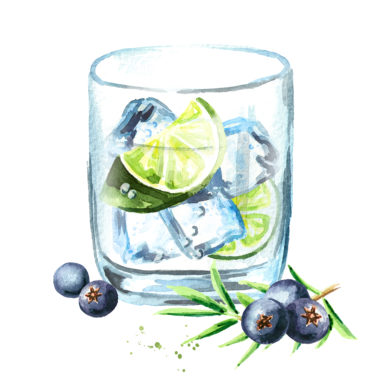Gin in general can be defined as a distilled spirit with a predominant flavor of juniper berries, with minimum alcoholic strength by volume of 37.5 – 40.0 % ABV depending on country.
Gin is made from neutral alcohol and various botanicals. Flavor profile and quality of gin will depend on quality of neutral spirit and type and quantity of botanicals used (roots, leaves, barks, fruits, seeds and flowers), as well as the method of flavoring: compounding, maceration or vapor infusion.
Besides Juniper berries following botanicals are widely used in gin production: coriander seeds, Angelica root, orange/lemon peel, licorice root, cinnamon bark and many others.
There are generally 3 gin flavoring techniques:
- Compounding: Character of neutral spirit are distinctly altered by adding flavours either in the form of essences or botanicals themselves. No redistillation required, and can be filtered to remove solids and/or flavor. This product cannot be called “distilled gin”.
- Maceration: Soaking botanicals in spirit for a period of time prior to distillation. The botanicals may remain in the pot or all/some be removed before distillation. Can be used to produce gin with quite a heavy aroma.
- Vapour infusion: the mix of juniper and botanicals do not come in contact with liquid as they are hung in a basket above the liquid level in the still. When heated the vapour passes through the botanicals picking up their flavour. With this technique usually gin with lighter flavour is produced.
-
DistilaMax® HT
DistilaMax® HT is an active dry yeast for use in many types of beverage alcohol fermentations and is especially suited for glucose based feedstocks (most grain and starch-based mashes). DistilaMax® HT is recommended for use in the production of Vodka, […][ Read more ] -
The Alcohol Textbook
The Ethanol Technology Institute, led by Scientific Director Dr Graeme Walker, publishes The Alcohol Textbook and conducts both The Alcohol School and Biofuels Academy. The 6th Edition of The Alcohol Textbook is now available. There is no better tool for […][ Read more ] -
DistilaVite®
During the process of alcoholic fermentation yeast, which is a complex living organism, is subject to various stressors: temperature, ethanol, pH, organic acids and others. In order to get a successful fermentation, yeast needs a balanced nutrient package which will maximize its potential […][ Read more ]

